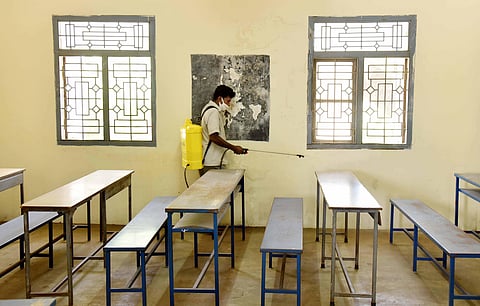It’s time to consider reopening schools
It has been nearly 16 months since 250 million school-going children in India have attended physical classes. By June 2021, schools were operating in some capacity in around 170 countries across the world. In fact, in most countries, schools continued to operate during the pandemic, except for some periods. It is time Indian policymakers urgently consider bringing children back to the schools.
The pandemic has forced school students to attend classes online. However, online teaching is not a replacement for in-school learning. It puts children from underprivileged backgrounds at a disadvantage as online teaching works better when supplemented by the parents. Moreover, interactions in school are important for overall development of communication, proficiency in language, interpersonal and social skills, and physical and emotional well-being, all of which have taken a backseat. Even before the pandemic, the quality of education and learning in Indian schools were considered suboptimal; with online teaching, the inequities have further widened.
India’s Covid-19 unlock plan has put emphasis on restarting tourism and opening up economic activities; however, there seems to be insufficient attention on restarting education activities and opening schools. It has been estimated that every month away from schools results in two months of learning lost, and children in India have already lost learning equal to 32 months. The children supposed to start school from the previous and this academic year are amongst those at the biggest disadvantage.
Some of the apprehensions on opening the schools are based upon alarmist and evidence-bereft high-decibel discourse, such as the claim that a third wave of Covid-19 would primarily affect children. This incorrect assertion created a lot of panic amongst the policymakers and parents, and any possible discussion about opening schools was put on hold. The fact is that children are not at additional risk of disease in any subsequent wave. The evidence from various sero-surveys across Indian states indicates that children have been infected at a similar rate as adults; however, their risk of developing severe disease is low. The reason is that the receptors that SARS-CoV-2 needs to enter lungs are underdeveloped in children. The evidence from the US indicates that vaccination of the adult population does not result in any change in severity of disease in children. The new variants do not alter the risk of moderate to severe disease in children.
There are three other key scientific pieces of evidence that should be given consideration. One, there is no need to wait for vaccination of children before opening schools. Global experts have concluded that vaccination of children is not a prerequisite to open them. In fact, no country in the world has yet started the vaccination of children younger than 12 years. With low risk, this age group is unlikely to be prioritised for vaccination for many months to come. Second, the inoculation of school staff would be a good idea but is not essential for opening schools. Third, schools for young children (up to Class 8) should be started first as this age group is at very low risk. The opening for older children (Class 9-12) should be more careful and with additional precautions.
It is imperative that Indian states give urgent attention and priority to formulating detailed plans and operational strategies to reopen schools. The broad principles of a school reopening strategy should be drafted by the Union government with complete freedom to the states for modification and implementation. The strategy should use global evidence, be guided by domain experts, informed by local epidemiology and flexible to be modified as the situation evolves.
Schools that cater to underprivileged children should be prioritised for opening up as many kids in these schools do not have anyone to guide their learnings at home. Special focus must also be given to those children who are about to enter the school education system.
As they plan to open up, schools should do the necessary structural modifications to ensure proper ventilation and spacing inside the classroom. Conducting classes in open (but shaded) spaces should be considered. The reopening can be supplemented by strengthening school health services, facilitating regular health check-up of children; periodically educating them on Covid-appropriate behavior as well as engaging parents should become integral to the process. School teachers and other staff need to be trained and sensitised in adherence to Covid protocols to ensure they are followed by students in classes.
The classes could be fewer than the earlier routine—alternate days, once in three days or even once a week—and there can be multiple shifts with reasonable breaks in between. The proportion of children attending school on a given day can be determined by the school authorities in consultation with parents. A hybrid of classroom and online teaching has to be continued, where parents would have complete choice on the mode of learning they would prefer. Regular sensitisation of parents to alleviate their fears would be needed. Approaches such as a school bio-bubble, in which students of a specific class would not interact with anyone outside it, need to be explored.
In our overzealous attempt to protect children from Covid-19, we should not end up depriving children of education and learning. Opening of schools is essential for their physical, mental, social and emotional well-being and development. With available scientific evidence, it is possible to develop a plan and get children safely back to schools, compensate for the lost time and bring them on the path of learning. It is time schools in India are opened once again.
Dr Chandrakant Lahariya
Epidemiologist and public health specialist
(The author has co-written the book ‘Till We Win: India’s Fight Against The COVID-19 Pandemic’)
(c.lahariya@gmail.com)

